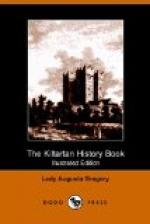“I’ll tell you now about the trace of Cromwell. There was a young lady was married to a gentleman, and she died with her first baby, and she was brought away into a forth by the fairies, the good people, as I suppose. She used to be sitting on the side of it combing her hair, and three times her husband saw her there, but he had not the courage to go and to bring her away. But there was a man of the name of Howley living near the forth, and he went out with his gun one day and he saw her beside the forth, and he brought her away to his house, and a young baby sprang between them at the end of a year. One day the husband was out shooting and he came in upon Howley’s land, and when young Howley heard the shooting he rose up and went out and he bade the gentleman to stop, for this was his land. So he stopped, and he said he was weary and thirsty, and he asked could he rest in the house. So young Howley said as long as he asked pardon he had leave to use what he liked. So he came in the house and he sat at the table, and he put his two eyes through the young lady. ‘If I didn’t see her dead and buried,’ he said, ’I’d say that to be my own wife.’ ‘Oh!’ said she, ’so I am your wife, and you are badly worthy of me, and you have the worst courage ever I knew, that you would not come and bring me away out of the forth as young Howley had the courage to bring me,’ she said. So then he asked young Howley would he give him back his wife. ‘I will give her,’ he said, ’but you never will get the child.’ So the child was reared, and when he was grown he went travelling up to Dublin. And he was at a hunt, and he lost the top of his boot, and he went into a shoemaker’s shop and he gave him half a sovereign for nothing but to put the tip on the boot, for he saw he was poor and had a big family. And more than that, when he was going away he took out three sovereigns and gave them to the blacksmith, and he looked at one of the little chaps, and he said ’That one will be in command of the whole of England.’ ‘Oh, that cannot be,’ said the blacksmith, ’where I am poor and have not the means to do anything for him.’ ’It will be as I tell you,’ said he, ‘and write me out now a docket,’ he said, ’that if ever that youngster will come to command Ireland, he will give me a free leg.’ So the docket was made out, and he brought it away with him. And sure enough, the shoemaker’s son listed, and was put at the head of soldiers, and got the command of England, and came with his soldiers to put down Ireland. And Howley saw them coming and he tied his handkerchief to the top of his stick, and when Cromwell saw that, he halted the army, ‘For there is some poor man in distress,’ he said. Then Howley showed him the docket his father had written. ’I will do some good thing for you on account of that,’ said Cromwell; ’and go now to the top of that high cliff,’ he said, ’and I’ll give as much land as you can see from it.’ And so he did give it to him. It was no wonder Howley to have known the shoemaker’s son would be in command and all would happen him, because of his mother that got knowledge in the years she was in the forth. That is the trace of Cromwell. I heard it at a wake, and I would believe it, and if I had time to put my mind to it, and if I was not on the road from Loughrea to Ballyvaughan, I could give you the foundations of it better.”




